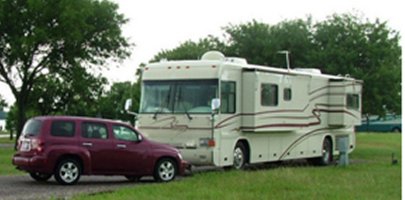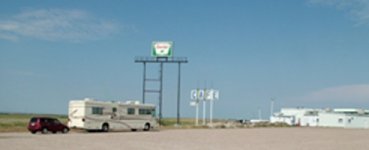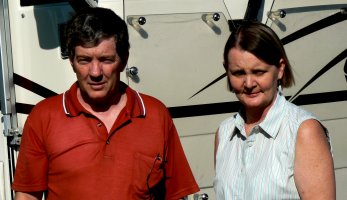|
The following was written for us by a citizen of Australia who is presently spending extended visits in the USA, travelling in his RV which they purchased here and have registered in Texas. He was kind enough to write this in an effort to assist anyone who may be considering making such a trip. The advice is from one who has done all of the things that he suggests.
We’re Bruce and Pam, our home is in Australia. We started our travels in June 1996 and are still enjoying the RV life-style. We return home often and our rig is stored in Texas when not touring the USA. We also have a motorhome in Australia which gives us a good basis on which to compare the two countries. We currently own a 40ft Country Coach Intrigue DP and tow a Chevy HHR. (Our first motorhome was a 35ft Holiday Rambler gas/petrol motorhome. We towed a Pontiac Grand Am). There are many issues you need to consider before beginning your adventure in the USA. The following is a summary of some of the issues we faced and maybe be of benefit to those who wish to follow. Although we are Aussies, many aspects will be similar for other non-US travellers. They are listed in no particular order of importance. Please remember that circumstances and events may change some of the following procedures and as a result they must be used as a guide only. It worked for us but we may have been lucky or unlucky at the time. Depending on the outcome. VISAs. For a visit to the USA of more than 3 months, a B1 / B2 business/visitor visa is necessary. The American Embassy in your home country issues these. A charge is made for the issue of the Visa. A VISA DOES NOT GIVE PERMISSION TO ENTER OR STAY IN THE USA. (A Visa may be issued for ten (10) years but this doesn’t mean you can stay for ten (10) years). Allow plenty of time for the Visa to be issued. On entering the US an I-94 card (application to enter the USA) has to be completed. (This will be handed to you on the plane to be filled out by you and any other family members). At the border/Airport an immigration official will decide whether you may enter the country. If permission is granted, the I-94 card will be stamped with the date of expiry and the bottom part stapled in your passport. Usually the maximum time of six months is granted. We have been able to stay longer than six months by presenting ourselves to an Immigration Office and giving evidence of our current status. It is our understanding that Immigrations main concern is your work status. We have presented evidence that we had sufficient funds to continue our travels. We also presented evidence of our past funds withdrawals to support our lifestyle. It is always up to the good will of the Immigrations Officer as to whether they grant an extension. Don’t try to quote the law to them or make any demands. It is our experience that being polite is critical to your results. (Immigration Offices can be very busy places. Make an appointment and be prepared for a long wait). We have also crossed into both Mexico and Canada and started another ‘visa period’. This is not always successful so be wary of relying on this tactic. It would be an offence to stay beyond the expiry date of the I-94 without permission. Once in the USA you can apply for an extension of your stay. Form I-539, Application to Extend/Change Non-immigrant Status is available online or by post from US Citizenship and Immigration Services www.uscis.gov. A fee is applicable. A detailed submission must be made explaining the circumstances for requesting an extension. BANKING. Australian issued credit/debit cards work fine in the US. Credit Card companies may make additional charges for foreign transactions. We've used National Bank Master Card credit cards and have found the service reliable. Remember banks may/will make a percentage charge on all transactions and the prevailing exchange rate will apply. (If you use an Australian issued card be sure it is Cirrus or Plus compatible. This is a worldwide standard/system that most banks recognise and will allow you to access your money back in Australia via an ATM). A US checking account can be valuable when buying goods or services online because a US billing address is usually required. We use Bank of America as they have branches all over the country and will issue you a Debit card for use in theirs and most ATM’s. Unlike Australia with it large nationwide banks the USA has many small local banks. Try to avoid these and look for a bank which has branches all over the country. Remember that without a SSN, (Social Security Number), you will not be able to earn interest on your bank funds. (It is possible but more trouble than it’s worth and may/will affect your tax situation back in Australia). To open an account all you need is ID and a valid US address. PHONES. Mobile phones, (Cell phones), are just as popular in the US as they are in Australia. Prepay phones can be bought cheaply and easily from retail outlets. Unlike in Australia, ‘air-time’ is charged both for incoming and outgoing calls. To keep the service active, and credit rolled-over month to month, regular payments have to be made (typically every 1, 2 or 3 months). Contract phones may be harder to come by without a SSN. The lack of a SSN (and US credit rating) prevented us entering a contract with Verizon for example. A 'call-card' may be economical for ringing home. We use campground Wifi internet and Skype to talk to our family back home at a much cheaper rate. (Free). Like the banking system there are few national phone providers. Phone use is not ‘seamless’ as it is in Australia. As a result a ‘roaming fee’ is required between the many other phone companies. These ‘other’ companies will charge you for using their service. So be careful of ‘roaming’ charges on your account. These can quickly add up as ‘roaming’ charges can be more expensive than the phone call itself. Be wary of any Australian company that tells you your phone will work in the USA. It may in some places and it may not. Some US phone companies will think they have hit pay dirt if you ‘roam’ to Australia! Leave your Aussie phone at home and pickup a prepaid phone in the USA. US ADDRESS. A legal address is required for registering, titling and insuring a vehicle. Certain states recognize PMBs (Private Mail Boxes) as legal addresses. Texas, South Dakota and Florida may be good choices for foreigners. We chose Texas, using the Mail Service address of the Escapees RV Club in Livingston. This mail service provides addresses for many RVers. MAIL. As indicated above, Escapees RV Club has a receipt and forwarding service. Other mail handling and forwarding services are available. DRIVING LICENCE. Australian driving licences are accepted. We have never been asked to show an International Driving Permit (this is NOT a driving license) but it may be useful in some States and maybe asked for by your insurance company. An Australian licence may attract loading of insurance premiums. For extended stays it is worth considering taking a US driving test. The driving test in Texas is far easier than an Australia driving test. A 'Driver Handbook' may be obtained from libraries or DMVs. The theory test has multiple choice questions, computer-based. Driving test centres can be very busy. BUYING AN RV. Just as in Australia, or anywhere else for that matter, caveat emptor . Research, research, research…visit lots of dealers…try to avoid getting stuck with a sales person too soon. This can be hard but despite their reputation sales people are almost human – you CAN get a lot of help from a good one! Some dealers have overseas customers and are familiar with the various requirements for foreigners. We would suggest using one of these dealers. Using a good dealer may cost a bit more but it will save you valuable time and frustration. We had good experiences with a Texas dealer who was familiar with our requirements. Your money will go a lot further in the USA than in Australia when buying an RV. Take your time. There are literally thousands of them to choose from. Decide what sort of camping/touring you wish to do before looking at RV’s. It is far too easy to fall in love with a glamorous RV that won’t suit your travel plans. (A 40ft motorhome is not going to fit into most National Park campgrounds. So if your preference is for National Parks look at smaller units). I would even suggest deciding on the ‘type’ of rig you want before leaving home. Then stick to your plans. It can get confusing and a good sales man will/may convince you that the one he just happens to have on special is the one for you! Be wary of ‘cheap’ rigs. The RV industry, like most industries, has a huge range of varying quality products. Remember the old saying, “something good for nothing is usually something good for nothing”. More dollars spent on a quality RV will add quality time to your touring. DOCUMENTATION. Buying, registering, titling and insurance should be straightforward provided you have a legally recognized address. Titling and Registering in Texas (Polk County) is straightforward. The folks in Polk County handle many many RV’s and are familiar with most requirements. They often process RV’s for foreigners and can help with most requirements. The cost of registration and titling varies from State to State. Online renewal is easy, even from Australia. INSURANCE. Unlike Australia, registration does not include compulsory third party insurance. You will need insurance BEFORE you register a vehicle. Insurance will include the legally required components for the state you are registering in. Insurance ‘terminology’ is different. Familiarise yourself with it. Insurance varies considerably from State to State and may be more expensive if using an Australian licence. Holding a US licence could make a big difference. Texas can be an expensive state for insurance. Some insurers do not write policies for Texas. We chose Progressive Insurance as they were happy to accept our foreign driving licenses and insured us in Texas. All arrangements were made by telephone, Internet and Fax. Be aware that you may not have any coverage when you leave your unit to return home - check policy conditions. As with ALL insurance policies, read the fine print. Due to Visa requirements and limits on your length of stay be wary of buying Full Timers coverage. REGISTRATION. Registration and Insurance go hand in hand in the USA. Again using a dealer will make this much easier. Keep in mind, that for US citizens, there can be many advantages registering and buying in a particular state that do not apply to foreigners. (Income Tax can be both a Federal and State issue in some states. Sales Tax may be non existing in some states, for state residents, and quite expensive in other states. Voting and residency laws also complicate the issue for US citizens plus other considerations). Be careful not to fall into the trap of trying to save money and as a result making your adventure more difficult than it should be. In many cases what you can save in one area you may lose in another area. You may buy in one state at a lower Sales Tax rate only to be asked for the difference when registering your RV in another state. We find that Texas offers by far the best compromise between costs, ease and convenience for foreigners. CLUBS. The Escapees RV Club recommended and almost a must. The club also has a number of good campgrounds. Good Sam is useful for members 10% discount on daily rate at many parks and its additional-cost RV breakdown service. FMCA may be of interest for those with motorhomes. INFORMATION. Trailer Life (trailers) or FMCA (motorhomes - both subscription) magazines. Escapees magazine can be useful. Big Rig Guide (purchase online and in some campgrounds) recommended if you have a large rig. Mountain Directory (buy online or at Camping World, east and west separately) is very helpful – there are a lot of big hills in the US! We use a Wal-Mart Rand MacNally Atlas - not brilliant but cheap and as good as the rest. Get State tourism maps from Information Centres or AAA. SatNav / GPS systems seem to have become almost the norm – not vital but probably very helpful and easy. We don't have one - yet!! PARK PASSES. Interagency Pass (National Parks Pass) is good value. The initial cost is quickly covered after a few visits. The annual pass can be purchased at information centres or at park entry booths on the first visit. Gives entry to all US National Parks and Monuments. States parks may not accept the National Pass. TAXES. Sales Tax is between 5 and 10 percent. Some States may have lower rates and Oregon, for example, has no sales tax BUT check whether you’d be able to register and title a vehicle. Oregon allows only genuine residents to buy and register there. Buying in one State and then registering in another may attract additional tax. INTERNET. We use places like libraries, restaurants, book stores and campground Wi-Fi to access the Internet for email etc Satellite broadband can be good but is VERY expensive. Wireless Internet is gradually becoming more widely available but campgrounds are still not well served (August 2008). Where it is available, daily rates range from free to $10. Often there is no additional charge but we've found that reception at campgrounds can be patchy, with variable signal strength and flaky systems. If you take a laptop with you make sure that it is capable of picking up the correct signals in the USA. For instance we have found that a laptop configured for wireless Big Pond would not work in the USA. Like everything else in the USA new laptops are cheap. I would recommend purchasing a new one in the USA and leave it stored with your RV. It will be all setup for the USA systems. Email your files home or burn CD’s.
CAMPGROUNDS. Unlike Australia, where most of the campgrounds are commercial ventures, the campgrounds in the USA are a mix of both commercial/private and governments owned facilities. Commercial/private campgrounds range from five star luxury establishments, with all the amenities, to sad dirty campgrounds that offer little more than refuge to the unemployed and poor. The public campground range from nothing more than a cleared piece of land in the wilderness to beautiful, full facility, parks. Almost all parks will offer the basics of water and dump points for black and grey water. Most will have some electricity. Unlike Australia the majority of parks cater for large rigs. Most parks, apart from some government run National and State parks, can accommodate 40 foot rigs. We thoroughly recommend purchasing one of the comprehensive Campground books. (The size of a city phone book).These large books list the vast majority of the parks and give good descriptions of the parks facilities including driving directions to the park. Trailer Life and Woodalls are two of the most popular editions. There are many place such as truck stops, rest areas and shopping outlets that will let you stay overnight. WHY THE USA? We have been asked this many times. There is no single answer that we can give to satisfy all those who asked us. A mix of extreme capitalism and wilderness. Crowded cities and vast forest areas. Harsh deserts and snowy mountains. Lakes and rivers that can be found even in the driest of deserts. The USA is certainly value for money. The cost of RVing in the USA is far cheaper than it is in Europe for instance. The people you meet along the way are friendly and helpful. Food is plentiful and cheap. And above all the RV gives you the ability to travel at your own pace with the knowledge that your bed, bathroom and refrigerator are just a few short steps away. There is far more to the USA than that which is portrayed by Hollywood.
Be warned. The USA has so much to offer that only the foolish would expect to see it all in a single life time.
|




